How to Write a Cover Letter that Gets You Noticed
Most people would prefer to be eaten alive slowly than write a cover letter
Let's be honest, talking about yourself and your experience can be just plain awkward and we'll avoid it at all costs.
In some cases we LOVE talking about ourselves but what makes a cover letter the opposite? It is the fact that we feel like we have to sell ourselves and we can’t be our genuine selves? Or is that we feel like someone's judging us?
Honestly, for most people, it's all those things.
Trust me, I've been there. I love sharing stories and talking about myself yet when I read my old cover letter they felt icky and impersonal. I felt like I was trying to sell myself and in turn, it was obvious I was being disingenuous.
It all changed when I discovered personal branding in college.
Personal branding is all about creating a narrative (story) about your life that connects with your audience (in this case the job).
That was my big AHA moment because storytelling felt much easier than “pitching myself”
This is how I did it
For every cover letter I did, I created a “thesis” statement. Now stick with me, I know thesis statements get a bad rep but they actually simplify the cover letter writing process
The thesis question is: What experience do you have that prepared you for the position you're about to take on?
(Yes I’m speaking in the present tense because you need to be thinking in present tense)
This is where your story comes in and you can start being creative.
Cookie-cutter cover letters have lost their appeal. So many people have hacked the cover letter process it's lost its edge and recruiters are seeing the same cover letters over and over again. How boring?!
By telling a story in three to five paragraphs you give your recruiter something to connect to and a break from all the other “here's my resume in paragraph form” cover letter.
Now for all my non-writing people out there, how do you create a narrative?
Well first you start with an origin point
For your cover letter, you need to decide where you want to start describing your professional journey, is at the start, the middle or the end? You have to pick a somewhere and that's where your cover letter starts
In my case, I'm a fan of starting at the beginning because I like to think I have an interesting origin story in my field. Here's an example of my cover letter opening that got me a job at the largest museum in my states
I discovered history the way a child finds a hidden gem. I was preoccupied with finding my true passion without taking stock of what academia had to offer me. When I started my academic journey at ( College), I hated history because I thought it was all about the depressing and unmotivating past of slavery. I quickly discovered how wrong I was. History was so much more than struggle; it was also about perseverance.
Not what you would expect would you?
You see you don't want to start with “hello there my name is so and so and I'm applying to the position of” because that not the juicy stuff and your recruiter already knows that.
The idea is that you want to capture their attention in a way that's authentic to your journey that led you up to apply to that position.
You may not have the same story as mine where you hated your career field before you started. Maybe your story is that you discovered your favorite lip gloss at age 16 because of fancy ads and several years later you realized the power of marketing and committed yourself to boost people's confidence through compelling ads.
The options are unlimited but think back to a defining moment in your life even if it's just ten minutes before writing your cover letter and think, what experience did I have that led me to even being interested in that position?
When you know why you are applying, that connects with recruiters and automatically makes you stand out.
Once you decide where you're starting in your story and you have your attention-grabbing open statement. You want to then describe what has prepared you for the role that you are going to do. It is good to pick 3-4 relevant experiences that you've had and then describe how those experiences translate to the skills the job position wants you to have.
A common mistake people make in this section is talking about the fanciest job title on their resume that doesn't have anything to do with what the job is asking for. THIS IS A BIG MISTAKE.
Before you do this portion look at the required skills and competency and find experiences that DIRECTLY relate to those skills that you can talk about. It is okay to include less formal experiences as long as you can talk about it in a professional way that clearly communicates what the outcome was of that experience.
In my application, I described volunteering and how that experience taught me the cultural sensitivity skills that the job description asked for. Did I have a more “fancy” experience? yes, but that experience TRULY highlighted the skill they asked for so I chose to speak on that instead.
Always focus on what the job is asking of you and not what you think they'll be impressed by.
1) it will make your cover letter more interesting to read because everyones trying to list their best positions without taking stock of what the employer is looking for.
2) It will make you seem more competent because you are clearly demonstrating what they are asking for
The next mistake people make in this section of listing their experience in chronological order. Stop it. This is not your fourth grade essay you do NOT need to speak in that way.
Your cover letter should sound as if you’re giving a Tedtalk. If you are reading your cover letter out loud and you can’t imagine captivating an audience you are doing it wrong.
The key is that you want to know the experience you are going to be highlighting beforehand but then it's okay to talk about those experiences as if you are telling a story. Always make sure to have a good transition and create a clear path from one idea to the next.
Remember you are trying to get the employer to understand why you are a good fit for the position not why the position is a good fit for you.
Remember when it comes to end your epic cover letter you want to let the company know why you chose them.
It's the dreaded, “why do you want to work here?” question. The reason you want to end by answering this question is that this is the question the company really wants answered and it's going to be the last thing they remember you by. At this point you've already convinced them that you are a great fit for the position but why do you even want it?
Remember you're creating a narrative so with any good narrative you want to tie into how the story began. So take a look at where you started your story and see what actually led you to apply to the position.
A shortened version of the cover letter that got me the position
Here are some reason and examples of how to phrase them
High pay
The company cares about the wellbeing of its employees by ensuring they are compensated for their work
The company is highly regarded and it is important for you to be apart of a culture that values excellent work
Close to enough to your ideal job
You want to learn more about X position by learning transferable skills from an organization that is known to foster that particular skill
I have a passion for building X skill and through the position, you can bring in the background in X while learning about the invaluable work that is being done at X company
Great work culture
I am in awe of X company conducts its business in such an innovative way and allows its workers to be creative yet productive
I strongly believe in X value and this company is a great example of how this value can be executed well
The key is that you want to peruse the company website and find just one thing that grabs your interest (even if it's a little bit) and talks about that thing like it's the rarest gem in the world.
Companies are like humans; they just want to feel a little special.
Lets Recap…
A good cover letter is like a really good ad, it covers:
Who are you? - The question you want to answer ASAP with your origin story
What do you do? Provide some personal anecdotes about why you are worth learning more about
Are you for me? Let the person know what about you specifically is beneficial to them
If you haven't answered all those questions within the first paragraph of your cover then you need to go back to the drawing board.











